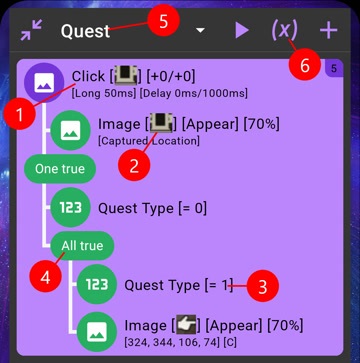A quick basic run through of how Abstract Mode works

The above image is the main part of Abstract Mode and it's also where you'll spend most of your time in.
-
The block
(1)with a purple icon is an Action.Action is something that your device can do (touch the screen, show message, press back, etc...) or something that change the macro's state (set variable, stop macro, etc...).
-
The block
(2)and(3)with a green icon is a Condition.Condition can be
trueorfalse.There are various type of Condition: detection, variable, time, etc...
Block
(2)is linked directly to an Action, that's called a Require Condition. In above example, an Image Appear condition is required for the action Click Image -
The block
(4)is a Condition Group.As the name suggested, it's used to link multiple Condition together.
You can set the group logic to
All True(every Condition in the group must betrue) orOne True(at least oneConditionin the group istrue) -
(5)is the current Job.Job is a way for you to split macro into smaller parts that are easier to manage.
This will be explained more here.
-
(6)is Variable.You can add boolean, number and string variable which can be used as a Condition.
This will be explained more here.
Abstract Mode works by these simple rules:
-
Action runs when Condition is true (duh)
Take above image as an example with "Click Image" action and "Image Appear" condition (ignore all the conditions below).
- If the current screen has that image at the [Capture Location] (wherever that is) then it'll click on that image.
- The clicking will continue as long as that image is on the screen (condition keep being true).
- If you navigate to another screen without that image then the clicking will stop.
- The clicking will continue again when you navigate back to that screen. You can think as if it "reacts" to the screen (it technically doesn't but that helps to visualize what happen).
Action without any Conditions will always run (condition always true).
-
Take above rule into account, the second rule is: All actions are independent and there is no order.
If a condition is true at any given moment and action is run after then they do not depend on each other and there's no guaranteed order of operations.
This has a lot benefits. Assuming the tradition Action 1 -> Action 2 -> Action 3 scenario. If one of the action fails in the chain then the whole chain will break, adding more action in between would be harder. But with action being independent you don't need to worry about that and adding more actions will less likely to break your macro.
Of course there are ways to enforce the order of operation if needed. You can use the condition Action Result or Custom Action.
- None. That's it now go make your macro.
© 2026 - Macrorify by KoK-CODE
